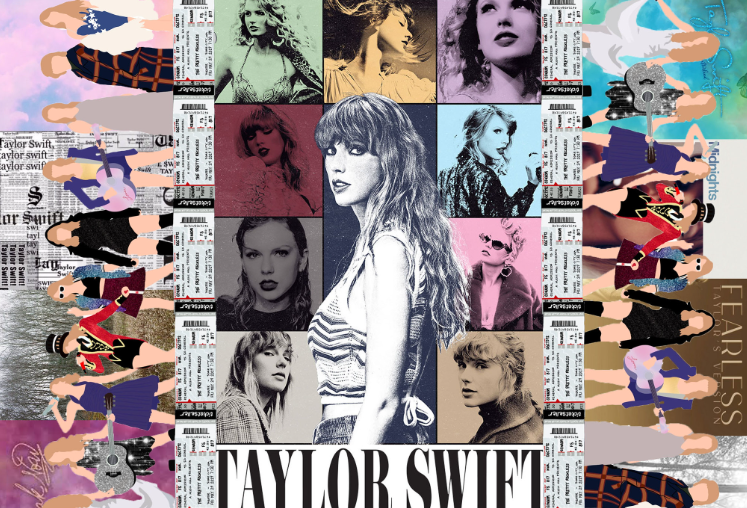A Review of Taylor Swift’s Reflective Narration in The Tortured Poets Department by Abigail Reed

It’s no wonder Taylor Swift’s The Tortured Poets Department resonates with a writer like me. For years, faithful Swifties have been acknowledging Taylor Swift as a poet. Lyrics from her two pandemic albums, Folklore and Evermore, captivated not just her usual audience but many sworn-never-to-become-Swifties, who later realized the Swiftie path was for them. Harvard even created a course on Swift’s music. In May 2022, she received an honorary PhD in fine arts from New York University. All this to say, Swift hasn’t had to fight for the persona of a beloved creative lyricist and poet in her audience’s eyes.
The Tortured Poets Department, Swift’s eleventh studio album, released on April 19, 2024, appeals to its literary-loving audience by being coded with black and white photography, initials embossed in foiled gold like a department logo, and imagery of typewriters, flowers, and clocks. Language such as “chairman” and “department meeting” was thrown around her social media in anticipation of the release. And even its release made itself out to be a momentous occasion. Two hours after the promised album was released, Swift announced it was a double release, sharing The Tortured Poets Department: The Anthology with 15 extra songs to the original 16 discography.
I listened to the album faithfully upon its release. As an MFA graduate in creative writing and a creative nonfiction writer, I was eager to decode the album Taylor had given to me and the world. As I listened, I realized that while the sounds and melodies of the record were unfamiliar, the narrative voice woven throughout was very familiar.
In creative nonfiction, the writer takes the reader through an experience, topic, or moment. But it isn’t enough to just sketch out these moments or experiences. Perhaps what allows creative nonfiction to stand out among other genres is the critical lens the writer puts themself under. It’s not enough to tell the reader about something. Readers want to see the writer reckon with the self, interrogate their decisions, and ultimately, come to a better understanding of who they are.
As I worked on my MFA thesis, a memoir on the generational anxiety that plagues my family, I had to question past decisions I’ve made. Simply tossing blame at others won’t do the trick. I must question how I reacted to others, what role I played in my own shortcomings, and finally, let go of the past. By doing this, I understood myself in a way I never have before.
In The Tortured Poets Department, Swift is doing something very similar. While she does meticulously document the actions of others and call them to accountability (“My Boy Only Breaks His Favorite Toys,” “thanK you aIMee,” “The Smallest Man Who Ever Lived”), the album is notably outbalanced by introspective songs about her own behavior (“Fortnight,” “Guilty as Sin?,” “Who’s Afraid of Little Old Me?,” “How Did It End”). In these songs, Swift is ruthless with herself, admitting to her repeated flawed behaviors in relationships, her desire to be liked by an audience, her addictions, and her desire for revenge against those who have wronged her. This brutal examination of the self carries the reader into much more poetic and self-removed songs that take pieces of herself and characterize them for an audience (“The Albatross,” “Cassandra,” “The Bolter,” “I Look in People’s Windows”). What started out as an album that playfully uses poetic imagery to take on those who have mistreated her grows into an album of honesty, vulnerability, and acceptance.
In perhaps the most telling song, “The Manuscript,” Swift takes a third-person point-of-view to look back at her past life experiences. While some Swifties (myself included) may be tempted to dissect the song for clues on who she’s singing about, a better approach is to acknowledge it for what it is, a holistic approach to this songwriter’s life. Like creative nonfiction writers, Swift has spent decades using personal experiences to weave stories for her audience to consume for pleasure. While sometimes these stories do take a darker, more serious approach (“peace” from Folklore, “Nothing New” from Red, and “Anti-Hero” from Midnights) most of the time the story remains simple, easily digestible, and fun to listen to.
In The Tortured Poets Department, we get something deeper. While it first surprised me to hear that some listeners aren’t immediately enjoying the album, upon further reflection I began to understand why. We don’t like to confront darker versions of ourselves. We don’t like to challenge our idea of who we are. Perhaps this is another reason why memoirs don’t flood the shelves in Target or Barnes and Noble. We prefer romance novels and catchy pop songs to take us away from what’s really the problem, ourselves.
Ultimately, while Swift’s album is a slight departure from her regular discography, this departure is not one to shun. If anything, we should be clamoring to keep listening to this record and continuing to follow her reflective voice. And perhaps, it will even inspire us to claim our own reflective voice for ourselves.
